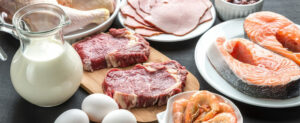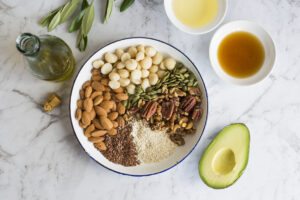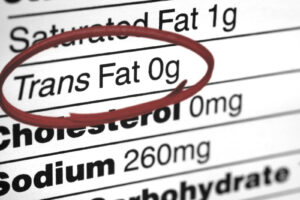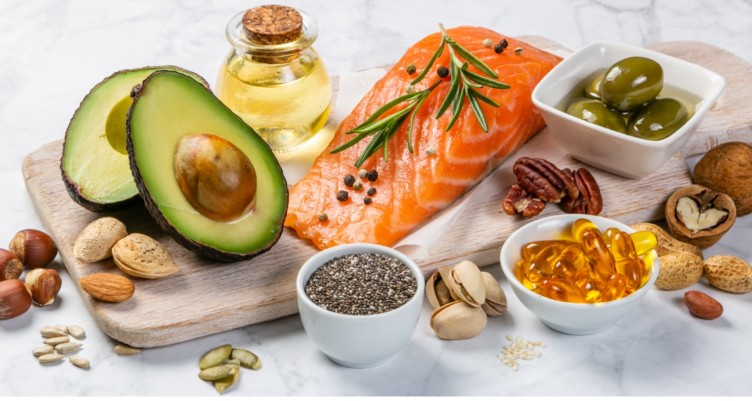Do you know which foods are high in fats? If not, don’t worry! This guide will tell you everything you need to know about fatty foods. We’ll cover the benefits of eating high-fat foods as well as the risks associated with them. Plus, we’ll provide a list of foods high in fat, for you to add to your diet. So, what are you waiting for? Read on to learn more about high-fat foods!
Contents
Defining Fat
 Fat is a type of macronutrient found in food. It is essential to human health, but too much can lead to weight gain and other health problems. Fat is made up of fatty acids, which are molecules that the body uses for energy. It also contains other nutrients like vitamins and minerals. Fat can be found in both plant and animal products.
Fat is a type of macronutrient found in food. It is essential to human health, but too much can lead to weight gain and other health problems. Fat is made up of fatty acids, which are molecules that the body uses for energy. It also contains other nutrients like vitamins and minerals. Fat can be found in both plant and animal products.
Types of fat
Fat can be classified into three main types: saturated, unsaturated, and trans fat.
- Saturated fat: It is found mostly in animal products, such as meat and dairy. This type of fat can increase your cholesterol levels and is linked to heart disease. It is solid at room temperature.
- Unsaturated fat: It is found in both plant and animal products. This type of fat can help lower your cholesterol levels and is linked to better heart health. It is liquid at room temperature. You can find two types of unsaturated fat: monounsaturated and polyunsaturated.
- Trans fat: It is found in processed foods, such as margarine, cookies, and crackers. This type of fat is linked to heart disease and is solid at room temperature. This is the worst type of fat for your health.
Importance of fat
Fat is an essential nutrient for the body. It helps to:
- Insulate the body and keep us warm: Fat is that layer of padding that keeps us warm in cold weather. It helps to insulate the body by trapping heat.
- Protect vital organs: Fat cushions and protects our internal organs, such as the liver, kidneys, and heart.
- Produce hormones: Fat is necessary for the production of hormones, such as testosterone and estrogen. It also helps in the regulation of these hormones.
- Absorb fat-soluble vitamins (A, D, E, and K): Fat helps the body to absorb these essential vitamins as they are soluble in fat.
- Help the body to grow and develop: Fat is essential for the growth and development of the body, especially during infancy and childhood.
- Provide energy: Fat is a concentrated source of energy. It provides the body with more than twice the amount of energy than carbohydrates or protein.
Foods High In Fats
Now that we know the importance of fat, let’s take a look at some foods that are high in fats. We have listed the foods high in fats based on the type of fat they contain.
Saturated fat

- Butter: It is one of the most commonly used fats in cooking. It is made from cow’s milk and is high in saturated fat.
- Cheese: It is another popular dairy product that is made from cow’s milk. It comes in many different flavors and is high in saturated fat. The highest content of saturated fat is found in cream cheese, followed by cheddar and mozzarella.
- Whole milk: Whole is defined as milk that has not been skimmed or had any of the fat removed. It is a good source of saturated fat.
- Cream: Cream, as we all know, is the fatty part of milk. It is used in many recipes and is high in saturated fat.
- Ice cream: Ice cream is a favorite dessert for many people. It is made from milk and cream and is high in saturated fat.
- Fatty cuts of meat, such as ribs and steak: It is best to avoid these meats as they are high in saturated fat. You can choose leaner cuts of meat, such as chicken or fish.
- Processed meats, such as bacon and sausage: These meats are high in saturated fat and are best avoided.
Unsaturated fat

- Olive oil: It is a popular cooking oil that is made from olives. It is high in monounsaturated fat and has many health benefits.
- Canola oil: It is another popular cooking oil that is made from the seeds of the canola plant. It is one of the healthiest oils as it is high in monounsaturated fat and low in saturated fat.
- Peanut oil: Peanut oil is made from peanuts and is known to be high in monounsaturated fat.
- Safflower oil: It is made from the seeds of the safflower plant and is high in polyunsaturated fat.
- Sunflower oil: Sunflower oil is also quite popular and is made from the seeds of the sunflower plant. It is high in polyunsaturated fat.
- Avocados: Avocados are a popular fruit that is commonly found in salads and dips. They are high in monounsaturated fat.
- Nuts, such as almonds and cashews: Nuts like almonds and cashews are a good source of both monounsaturated and polyunsaturated fat.
- Seeds, such as pumpkin and sesame seeds: Seeds like these are also a good source of both monounsaturated and polyunsaturated fat.
- Fish, such as salmon and tuna: Tuna and salmon are two of the most popular fish. They are a good source of polyunsaturated fat, as well as omega-three fatty acids, which are beneficial for the heart.
Trans fat

- Margarine: Margarine is a popular spread that is used in place of butter. It is made from vegetable oils and contains trans fat.
- Cookies: Cookies are a favorite snack for many people. They are often made with margarine, which contains trans fat.
- Crackers: Crackers are another popular snack food. They are also often made with margarine, which is high in trans fat.
- Chips: Chips are popular snack food. They are often made with vegetable oils, which may contain trans fat.
- Frozen pizzas: Frozen pizzas are a quick and easy meal. They are often made with vegetable oils, which may contain trans fat.
- Cakes: Cakes are a popular dessert. They are often made with margarine, which contains trans fat.
- Pies: Pies are another popular dessert. They contain trans fat if they are made with margarine or shortening.
- Some types of vegetable oils, such as soybean, palm, and cottonseed oil: These are some commonly used oils that may contain trans fat.
As you can see, there are many foods that are high in fats. While some of these fats are good for you, others can be bad for your health. Be sure to check with your doctor or nutritionist before making any changes to your diet.
How To Incorporate Healthy Fats In Your Diet?
Now that you know which foods are high in fats, you may be wondering how to incorporate them into your diet. Here are some tips:
Choose healthy fats
Healthy fats help to reduce cholesterol and improve heart health. They can also help to lower blood pressure and improve blood sugar levels.
Some healthy fats include:
- Olive oil
- Canola oil
- Nuts
- Seeds
- Avocados
Try to incorporate these healthy fats into your diet by using them in place of other fats. For example, use olive oil instead of butter when cooking.
Limit saturated fats
Saturated fats are bad for your health and should be limited in your diet. They may raise cholesterol levels and increase the risk of heart disease.
Some saturated fats include:
- Butter
- Lard
- Cream
- Cheese
- Bacon
- Sausage
- Pizza
- Chips
- Cookies
Try to limit these foods in your diet and choose healthier alternatives.
Avoid trans fats
 Trans fats are linked with a number of health problems, such as heart disease and stroke. They are often found in processed foods, so it is best to avoid them.
Trans fats are linked with a number of health problems, such as heart disease and stroke. They are often found in processed foods, so it is best to avoid them.
Some foods that may contain trans fats include:
- Margarine
- Cookies
- Crackers
- Chips
- Frozen pizzas
- Cakes
- Pies
- Vegetable oils
When choosing foods, be sure to check the label for trans fat content. If a food contains trans fat, it should be avoided.
Get your fat from food
Foods that are high in fat are the best source of healthy fats. This is because they also contain other nutrients that are essential for good health. You need to be mindful of the types of fats you eat, as well as the amounts. Too much of any type of fat can be bad for your health.
Be sure to talk to your doctor or nutritionist about the best way to incorporate fats into your diet. They can help you make sure you are getting the right types and amounts of fat.
Spread your fat intake throughout the day
When you are trying to include healthy fats in your diet, it is important to spread them out throughout the day. This will help you get the most benefit from them.
For example, you could have a breakfast that includes eggs and avocado. During lunch, you could have a salad with olive oil and nuts. For dinner, you could have salmon with vegetables.
Spreading your fat intake throughout the day will help you avoid consuming too much of any one type of fat.
As you can see, there are many ways to incorporate healthy fats into your diet. Try these simple tips to help you get started.
Limitations Of Fatty Foods
While fat is an essential nutrient, eating too much of it can lead to weight gain and other health problems.
- Firstly, fat is a concentrated source of energy. This means that it contains more calories than other nutrients, such as carbohydrates and protein.
- Secondly, eating too much fat can lead to an increase in your cholesterol levels. This, in turn, can increase your risk of heart disease.
- Finally, eating too much fat can also lead to other health problems, such as obesity, diabetes, and cancer.
That is why it is important to limit your intake of fatty foods. Be sure to talk to your doctor or nutritionist about how much fat you should be eating each day.
Conclusion
In conclusion, fats are an essential part of a healthy diet. They provide energy, help the body absorb vitamins, and support cell growth. However, it is important to choose healthy fats, such as those found in olive oil, nuts, and fish. Too much fat can lead to weight gain and other health problems, so it is important to eat fats in moderation.
Foods high in fats can be a part of a healthy diet, but it is important to know which ones to choose. The monounsaturated and polyunsaturated fats found in olive oil, nuts, and fish are the best choices. Trans fats and saturated fats should be avoided as much as possible. By making smart choices, you can enjoy the benefits of fat without putting your health at risk.
For more such food suggestions and weight loss tips, please contact Mantra Care. Their team of experts will help you develop a healthy weight loss program that is tailored to your specific needs and goals. You can also get in touch with their nutrition experts and expert dietitians through their online nutrition counseling, who can guide you through the process and help you achieve your fitness goals.


